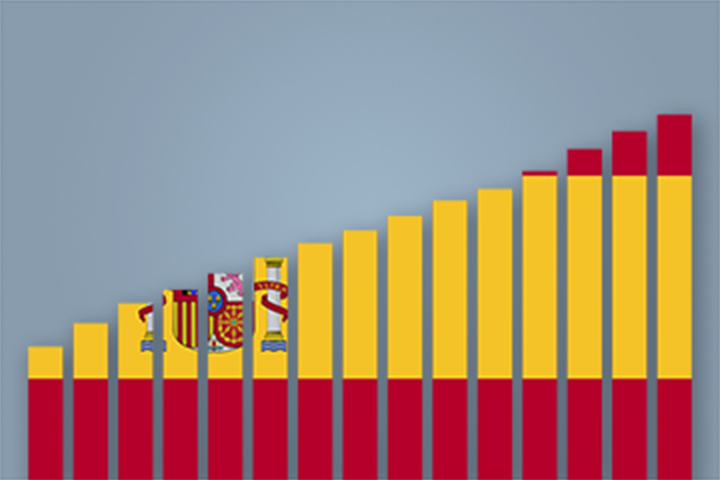How can you invest in space travel?

Keytrade Bank
keytradebank.be
January 24, 2024
(updated February 28, 2024)
3 minutes to read
People have always been fascinated by space. This is not something we see only in the modern world, but also in myths and legends. The Tower of Babel, which was said to have reached all the way to heaven, is one such legend. Or the legend of Wan Hu, a Chinese man who had a crater named after him on the Moon. Thought to have lived in the 16th century, he was the world’s first "astronaut" when he was shot into space in a chair. It is said to have reached a height of ... 30 centimetres.
Today, we have managed to come a few steps further. Lower launch costs, technological advances and growing interest from private investors have all led to the emergence of a real space travel economy in recent decades. According to the latest data (2022), its value is estimated at USD 546 billion, just shy of the whole Belgian economy (USD 583 billion in 2022). Forecasts should always be taken with a few pinches of salt – USD 1,000 billion by 2040? – but there seems to be little doubt as to which direction the space travel economy will take: the only way is up.
A sky twinkling with stars and satellites
Since the first satellite went into space in 1957, more than 11,000 have followed its path. The lion’s share of these have been launched in the last five years. Various daily activities have become dependent on these satellites. They facilitate telecommunications and bring the Internet to (almost) every corner of the globe. They are also essential for navigation: without satellites, we would still be driving with a map on our laps. Finally, satellites also play a role in monitoring the Earth for climate, military and other purposes. The emergence of more compact satellites – some smaller than a toaster – has opened the door to a wide range of commercial applications. These small satellites can be launched in large quantities and at a much lower cost, which has significantly democratised access to space.
Reusable rockets
Whether we are looking at AI or cars, sometimes just one disruptive technology is what it takes to create a wave of other innovations. Things are no different in the space travel sector. One part of this picture is the development of reusable rockets, a concept that once looked like science fiction but has now become reality, with companies such as SpaceX and Blue Origin leading the way. This development not only cuts the cost of space flights, but also increases the frequency with which missions can be carried out. If you want to put a satellite or another object in orbit around Earth today, you don't need to call on NASA or a space travel agency. You can "simply" request a quote online from one of the private companies that launch (reusable) rockets.
Back to the Moon
Another exciting aspect is the start of space tourism. Although these flights are currently still the preserve of those with the thickest wallets, costs are likely to fall as technology matures. This also demonstrates the remarkable development of a sector that was once solely the province of national governments, but that is now increasingly becoming a playing field for private companies. The future of space travel could also become even more fascinating with the development of deep space exploration. While the Moon and the International Space Station (ISS) have been the primary destinations for manned space flights, some entrepreneurs are already dreaming of more distant destinations.

Mining metals and capturing sunlight
As access to space becomes more democratic, new applications may also emerge. One of these opportunities is the development of commercial space stations. These stations can serve as hubs for a combination of research and tourism, providing a unique environment for experiments that are not possible on Earth.
Mining precious metals and rare minerals from the Moon or asteroids is also a potentially lucrative business that some companies are looking at.
In addition, research is also underway into the concept of "space-based solar power" – the idea of collecting solar energy in space and transmitting it to Earth. Although still in its infancy, this technology promises a constant energy supply.
Few fish in the investment pool
The space travel sector includes a growing number of pure players. However, the vast majority of these companies are unlisted. Most focus on launching satellites into space and providing wireless data comms, but there are also niches such as space tourism and space cargo. Some pure players listed on the stock exchange include: Intuitive Machines, Astra Space, Rocket Lab, Iridium Communications, Spire Global, Planet Labs, EchoStar and Viasat.
In other words, the investment universe featuring pure players is still relatively small. And for those investors who took have already taken a bet on it, the ride has been far from smooth. One of the (many) disappointments is Virgin Galactic Holdings. Richard Branson’s company peaked at a price above USD 55.00. Since then, the share price has fallen to around USD 2.00. Such price implosions do, naturally, also occur in less adventurous projects and sectors. But investing in a sector that is still in its infancy increases the unpredictability even further.
How to spread risk
For investors who want to tap into the potential of the space travel industry but are wary of the volatility and risky nature of individual stocks, alternative strategies are worth considering. This can also be done, for example, by investing in more established companies for whom space travel is just one of several sectors in which they operate. For example, some major defence companies like Lockheed Martin and Northrup Grumman are also involved in the space travel industry, as are aircraft manufacturers Boeing and Airbus.
An alternative or additional way is to invest in investment funds or trackers that focus on space travel and related technologies. They offer the opportunity to invest in a diverse portfolio of companies that have a direct link to space travel. The diversified nature of ETFs means that even if one or two companies in the index experience setbacks, the performance of the other companies may be able to offset these losses. Please note that these trackers do still involve high risks. The space travel sector is still relatively early in its development cycle, and remains very vulnerable to ups and downs.
Looking for space travel trackers or funds?
- Log in to Keytradebank.be on your laptop or desktop
- Click on Advanced at the top of the screen, then ask to search by instrument name, symbol or ISIN
- Tick Tracker and/or Fund
- Search for the word Space


